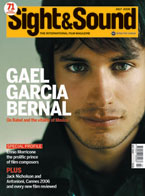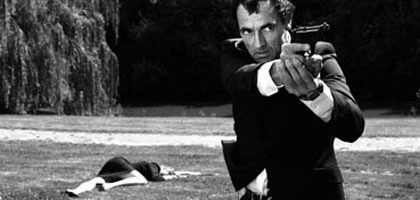Primary navigation


Jonathan Romney visits the fringes
Cannes may be a monumental festival, but it doesn't always reward monuments. That's why it's so heartening when great minor-key films like the Dardennes' 'Rosetta' and 'L'Enfant' win the competition, and why it's such a relief that many tipsters' Palme d'Or favourite this year, Alejandro González Iñárritu's 'Babel', was passed over in favour of Ken Loach.
Other sections of the festival yielded no great bolt-from-the-blue revelations, however, and even the expected shocker 'Taxidermia' caused fewer ripples than predicted. Far more authentic and perplexing was 'Avida', the second film by Delépine and Kervern, the French duo behind the wheelchair road comedy 'Aaltra'. Working once more in black and white, they go further afield this time, starting out near Tati territory and ending in full-on surrealist mode, heaving a fat lady up a mountain to encounter a community of wardrobe-dwelling misfits. The gags still pile up thick and fast, along with cameos by the likes of Claude Chabrol and Jean-Claude Carrière, but here Delépine and Kervern go for broke, seemingly unconcerned whether any viewers come along for the ride but relishing the adventure of making it. Love them, hate them, or recoil in bewilderment, these are true marginals and anarchists, and Cannes need them - this year, perhaps, more than ever.
A tip of the hat should also go to a couple of other distinctly individual film-makers who follow no one's path but their own. Pedro Costa's 'Colossal Youth' ('Juventude em marcha') is so sparely uncompromising that you wonder why it was included in competition, but for anyone willing to stay the course, it was quite something. Costa's film is a quasi-documentary poetic fiction about a group of subsistence-level Lisbon dwellers, largely of Cape Verdean origin. Its monologues and dialogues, delivered in affectless tones by non-professionals, have a mantra-like clarity, and the digital photography (partly by Costa himself) creates a nearly black-and-white effect of lunar austerity, as if etched on the screen in chalk and charcoal. In many ways, this was as close to gallery video as the festival came - closer even than Douglas Gordon and Philippe Parreno's 'Zidane, un portrait du 21ème siècle', which offers more obvious concessions (pop score, snappy editing) to mainstream movie pleasure.
The other absolute individualist, Eugène Green - French but born in the US - contributed the strongest short to a bizarre, heteroclite programme that also included Gaspar Noé (poignant, believe it or not), Jane Campion (gently impassioned), François Ozon (middle-aged) and Monte Hellman (don't ask). Green's half-hour 'Les Signes', about the family of a man lost at sea, is very much of a piece with his features 'Le Monde vivant' and 'Le Pont des Arts' - in other words, sweetly enigmatic, exquisitely poised and with a fascinating ability to fabricate rhymes and metaphors that are at once verbal and visual. Working in short form, however, allows Green to highlight his formalism in a new way, and 'Les Signes' is as precisely hewn and as resonantly strange as a Mallarmé sonnet. A true aesthete as well as a subtle farceur, Green continues to be French cinema's great undiscovered treasure, and 'Les Signes' gently, concisely, joyfully deflated much of the bombast that surrounded it in Cannes.